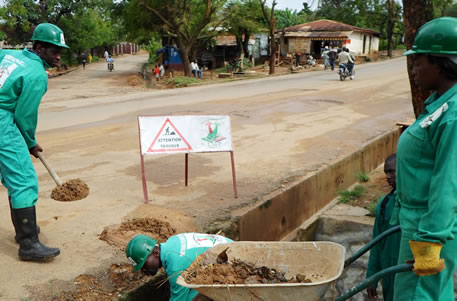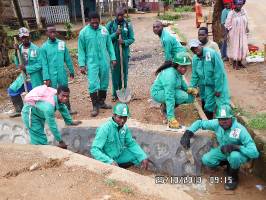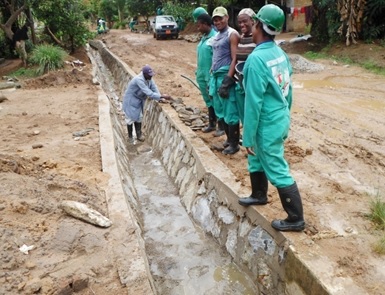CONTEXT
 The fight against unemployment remains at the heart of the Cameroonian government's action. This unemployment is accentuated among young people living in cities such as Douala and Yaoundé where the unemployment rate sometimes reaches 24% and 35% respectively.
The fight against unemployment remains at the heart of the Cameroonian government's action. This unemployment is accentuated among young people living in cities such as Douala and Yaoundé where the unemployment rate sometimes reaches 24% and 35% respectively.
To address this problem, NEF, which is at the forefront of this fight, has, among other things, designed a programme called the Urban Special Employment Programme (USEP), or "Programme Spécial d'Emplois Urbains".
This programme is based on the use of a strong local labour force, through High Intensity Labour Force (HILF) projects, in order to integrate unemployed young people, through development, redevelopment, sanitation and improvement of social services in the cities.
The "USEP" programme thus responds to two concerns: the improvement of the urban living environment and the reduction of youth unemployment.
OBJECTIVES
MAIN OBJECTIVE  The main objective of the USEP Programme is to create local jobs through High Intensity Labour Force activities (HILF) in the cities of Cameroon, by contributing to the sanitation and improvement of the public environment of these cities, and by fighting against unemployment.
The main objective of the USEP Programme is to create local jobs through High Intensity Labour Force activities (HILF) in the cities of Cameroon, by contributing to the sanitation and improvement of the public environment of these cities, and by fighting against unemployment.
SPECIFIC OBJECTIVES
More specifically, this Programme aims to:
- Fight against mass unemployment;
- Enable the beneficiaries to enjoy an income, and reduce poverty;
- Provide useful services through labour intensive activities and beautify the cities;
- Train young people to give them a qualification in sanitation and urban infrastructure construction.
THE TARGET GROUP

The target group is made up of unemployed people who are registered with the NEF, who have the appropriate attitudes and physical aptitudes for the activities to be carried out, and who live in the municipalities concerned. Young unemployed people aged between 15 and 35 are particularly targeted.
THE ACTIVITIES

The activities of the USEP Programme concern:
- The construction of gutters in local materials;
- The cleaning of gutters;
- Embellishment of urban areas (flowering of the city)
- The repair of public buildings;
- The clearing of undergrowth from public areas;
- Pruning of trees in public areas;
- The refuse collection and its eventual transformation into compost;
- The development or redevelopment of public gardens and recreational areas;
- The construction of monuments and other squares and areas of attraction.
THE PARTNERS OF THE PROGRAMME
The USEP Programme is implemented in the field on the basis of a Memorandum of Understanding between NEF and the local authorities. Its management is based on a partnership with the following institutions:
- Ministry of Employment and Vocational Training (MINEFOP);
- Ministry of Housing and Urban Development (MINHDU);
- Ministry of Economy, Planning (MINEPAT);
- Ministry of Territorial Administration and Decentralisation (MINATD);
- Ministry of Public Works (MINTP);
- Ministry of Forestry and Wildlife (MINFOF);
- International Labour Office (ILO); and
- Any other institution likely to contribute to the development of the Programme.
PROGRAMME IMPLEMENTATION
The implementation of the Programme goes through the following phases:
- Consultation meetings and agreement of the two main partners (NEF -Mayor's Office).
- Signature of the agreement protocol.
- Constitution and setting up of the Steering Committee.
- Constitution and setting up of the management team.
- Drawing up the configurations of the activities to be carried out.
- Establishment of programme resources
- Acquisition of premises and fitting out.
- Acquisition of necessary materials.
- Selection of beneficiaries.
- Launching of activities on the basis of an activity schedule
- Follow-up and evaluation.
EXPECTED RESULTS
The expected results of this programme are:
- Decrease the urban unemployment of youth,
- Reduced insecurity in the cities,
- Increased income for young people and reduced poverty,
- Embellishment of the cities and the living environment of the populations,
- Training of young people in sanitation and urban infrastructure construction
CONDITIONS FOR SUCCES
Seven major conditions are crucial for the success of this programme. These are :
- The involvement of local authorities
- The support of the administrative authorities;
- The availability of financial and material resources;
- Good monitoring of the programme;
- A rigorous and wise selection of recipients;
- Good technical and psychological support and supervision of the recipients;
- Accession of the urban population.


